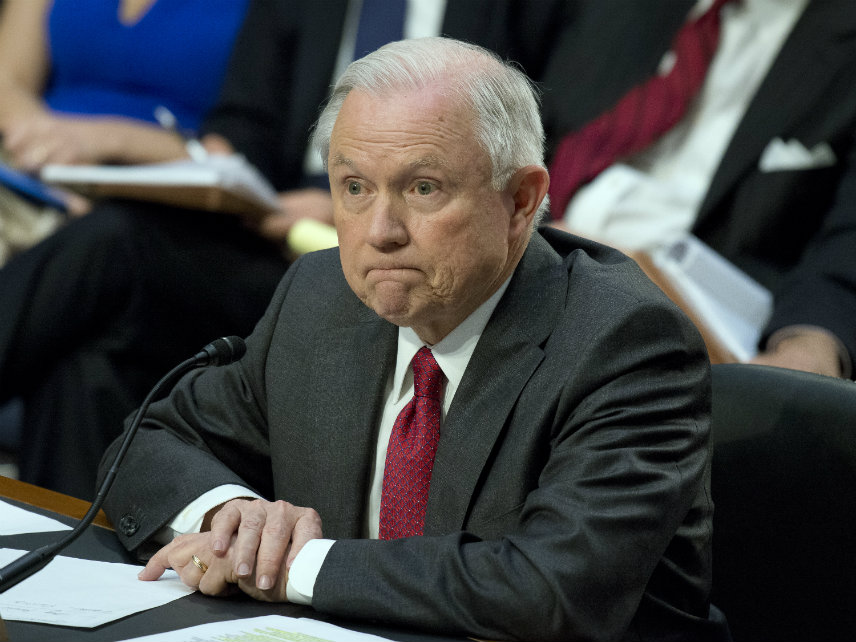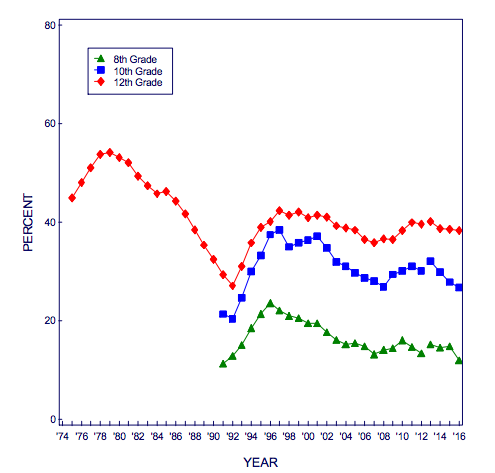Jeff Sessions Wants to Revive DARE
Sessions' nostalgia for the "just say no" campaign glosses over the fact that it didn't work.

U.S. Attorney General Jeff Sessions called for the return of DARE and its famous "just say no" campaign yesterday, calling it "the best remembered anti-drug program today."
"In recent years, people have not paid much attention to that message, but they are ready to hear it again," Sessions told the conference.
Anyone who went to school in the late 1980s or the '90s probably remembers DARE, where uniformed police would come into classrooms and give presentations on the dangers of drug use. There were also DARE shirts and a rocking DARE theme song, complete with driving bass, synth lines, and an atrocious children's chorus. There's a also a decent chance that, if you sat through a DARE presentation, you still ended up saying yes to drugs, because the program was never very effective.
But as with most of the failed drug policies of the 1980s, Sessions remembers it fondly:
"In the 1980s, when I was a federal prosecutor, we confronted skyrocketing drug abuse rates across the country, and we were successful," Sessions told the Drug Abuse Resistance Education International Training Conference in Texas, according to a transcript of his prepared remarks. "In 1980, half of our high school seniors admitted they had used an illegal drug sometime in that year. But through enforcing our laws and by developing effective prevention strategies, we steadily brought those rates down."
"We were in the beginning of this fight, in 1983, when DARE was founded in Los Angeles," Sessions continued. "I believe that DARE was instrumental to our success by educating children on the dangers of drug use."
It's more than a bit generous to attribute declining drug use to factors like the Justice Department's devastating war on crack and commercials where the Ninja Turtles tell kids not to smoke reefer. Drug use among teens began declining around 1981, well before the creation of DARE and well before the Reagan administration's amped-up war on narcotics, according to annual surveys by the Monitoring Our Future study.

Teen drug use continued to decline through the '80s, but it started rising again in 1992, when DARE was already ubiquitous in school curricula around the country. That rise leveled off around the end of the decade. Reported teen drug use fell and rose slightly again during the 2000s. And then, despite the lamentations of drug warriors like Sessions over the purported perils of marijuana legalization, it started dropping again in 2014.
The apparent lack of any relation between teen drug use trends and DARE programming led curious researchers to ask just how effective the "just say no" campaign really was. As Reason wrote back in 2004, their findings were not good for DARE.:
During the last decade DARE has been widely criticized as unproven and unsophisticated. In one of the most damning studies, published in 1999, a team of researchers at the University of Kentucky found that 10 years after receiving the anti-drug lessons, former DARE students were no different from non-DARE students in terms of drug use, drug attitudes, or self-esteem. "This report adds to the accumulating literature on DARE's lack of efficacy in preventing or reducing substance use," the researchers noted. In a 2003 report, the General Accounting Office reviewed six long-term evaluations of DARE and concluded that there were "no significant differences in illicit drug use between students who received DARE…and students who did not." The surgeon general, the National Academy of Sciences, and the U.S. Department of Education also have declared DARE ineffective.
Numerous studies over the 2000s found the same thing. In 2011, DARE started a new program—the adorably named "keepin' it REAL"—that was developed by actual prevention specialists rather than cops. That program has proven more effective. Sessions' misplaced nostalgia for the 1980s and its failed drug policies does no one, including DARE, any favors.


Show Comments (47)